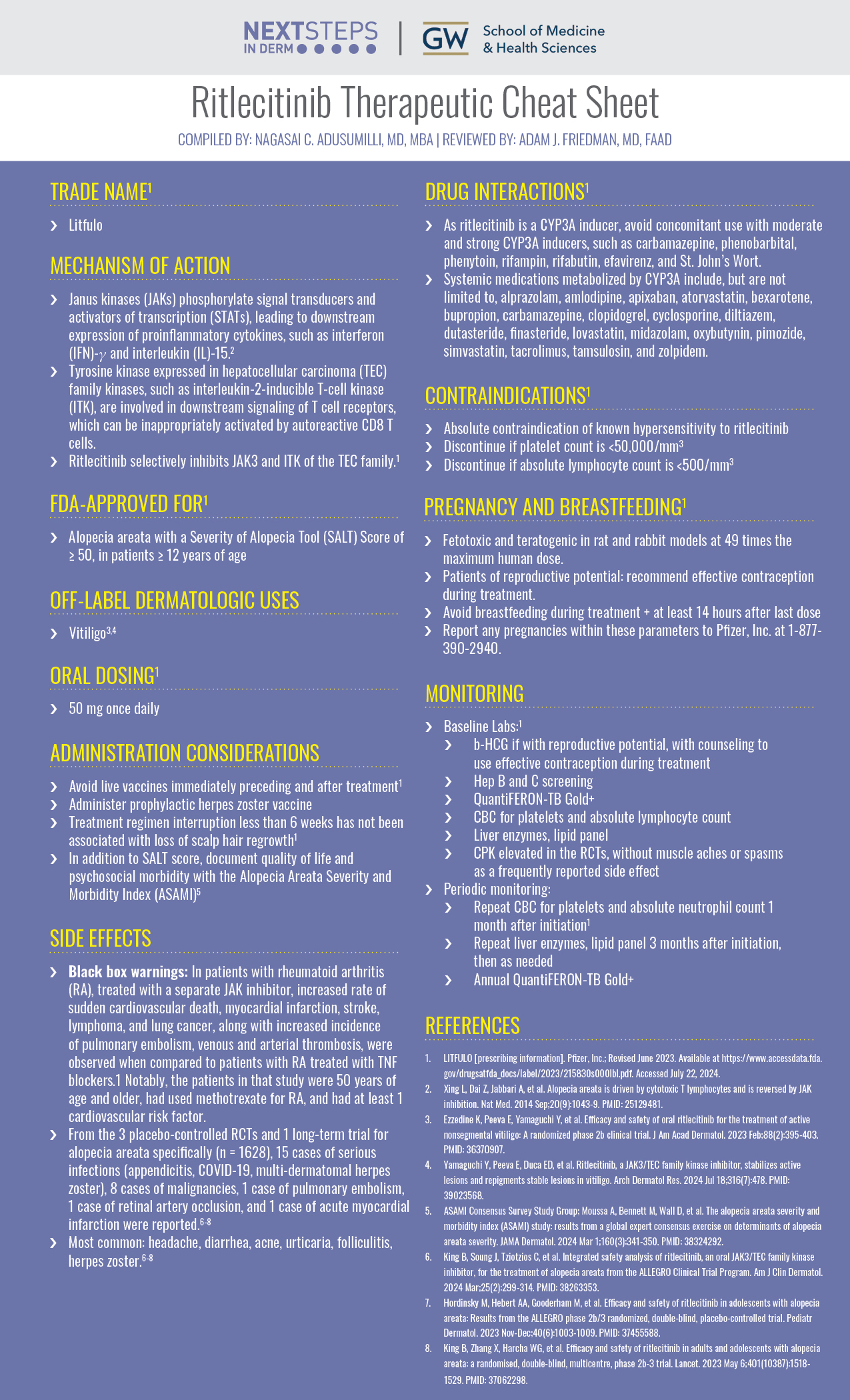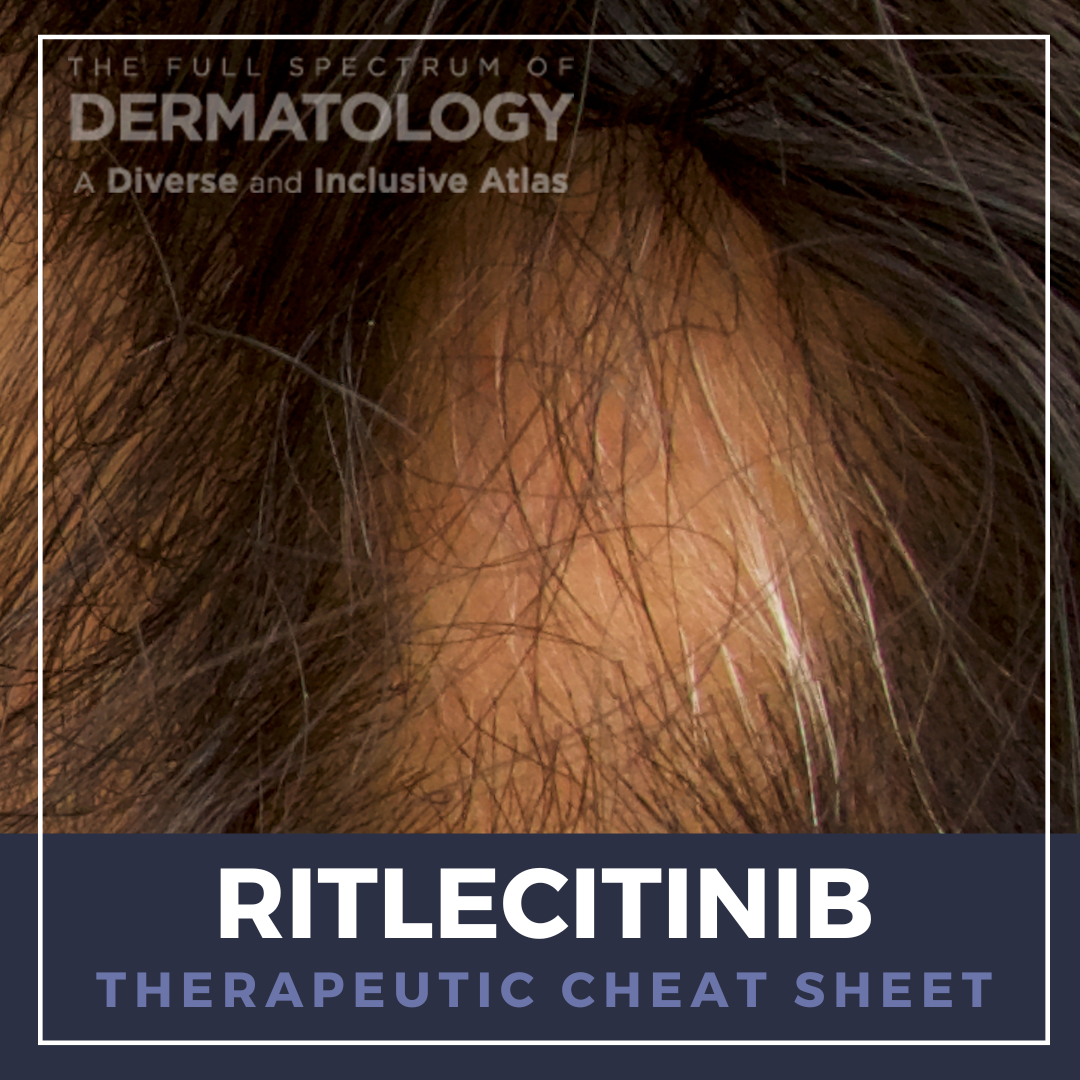Alopecia areata (AA) is a nonscarring alopecia driven by autoreactive cytotoxic CD8 T cells against hair follicle antigens. With an unpredictable clinical course, which can include alopecia totalis and universalis, AA can be debilitating to patients’ quality of life. Historically, glucocorticosteroids, cyclosporine, methotrexate, and azathioprine were used off-label for non-targeted immunosuppression. Multiple oral JAK inhibitors now provide more targeted treatment options. We continue our series, Therapeutic Cheat Sheet, with a closer look at ritlecitinib, which is approved by the United States Food and Drug Administration for severe alopecia areata in patients down to 12 years of age. Ritlecitinib is also used off-label for patients with nonsegmental vitiligo.
Ritlecitinib Therapeutic Cheat Sheet
Compiled by: Nagasai C. Adusumilli, MD, MBA | Reviewed by: Adam J. Friedman, MD, FAAD
TRADE NAME1
-
- Litfulo
MECHANISM OF ACTION
-
- Janus kinases (JAKs) phosphorylate signal transducers and activators of transcription (STATs), leading to downstream expression of proinflammatory cytokines, such as interferon (IFN)-γ and interleukin (IL)-15.2
- Tyrosine kinase expressed in hepatocellular carcinoma (TEC) family kinases, such as interleukin-2-inducible T-cell kinase (ITK), are involved in downstream signaling of T cell receptors, which can be inappropriately activated by autoreactive CD8 T cells.
- Ritlecitinib selectively inhibits JAK3 and ITK of the TEC family.1
FDA-APPROVED FOR1
-
- Alopecia areata with a Severity of Alopecia Tool (SALT) Score of ≥ 50, in patients ≥ 12 years of age
OFF-LABEL DERMATOLOGIC USES
-
- Vitiligo3,4
ORAL DOSING1
-
- 50 mg once daily
ADMINISTRATION CONSIDERATIONS
-
- Avoid live vaccines immediately preceding and after treatment1
- Administer prophylactic herpes zoster vaccine
- Treatment regimen interruption less than 6 weeks has not been associated with loss of scalp hair regrowth1
- In addition to SALT score, document quality of life and psychosocial morbidity with the Alopecia Areata Severity and Morbidity Index (ASAMI)5
SIDE EFFECTS
-
- Black box warnings: In patients with rheumatoid arthritis (RA), treated with a separate JAK inhibitor, increased rate of sudden cardiovascular death, myocardial infarction, stroke, lymphoma, and lung cancer, along with increased incidence of pulmonary embolism, venous and arterial thrombosis, were observed when compared to patients with RA treated with TNF blockers.1 Notably, the patients in that study were 50 years of age and older, had used methotrexate for RA, and had at least 1 cardiovascular risk factor.
- From the 3 placebo-controlled RCTs and 1 long-term trial for alopecia areata specifically (n = 1628), 15 cases of serious infections (appendicitis, COVID-19, multi-dermatomal herpes zoster), 8 cases of malignancies, 1 case of pulmonary embolism, 1 case of retinal artery occlusion, and 1 case of acute myocardial infarction were reported.6-8
- Most common: headache, diarrhea, acne, urticaria, folliculitis, herpes zoster.6-8
DRUG INTERACTIONS1
-
- As ritlecitinib is a CYP3A inducer, avoid concomitant use with moderate and strong CYP3A inducers, such as carbamazepine, phenobarbital, phenytoin, rifampin, rifabutin, efavirenz, and St. John’s Wort.
- Systemic medications metabolized by CYP3A include, but are not limited to, alprazolam, amlodipine, apixaban, atorvastatin, bexarotene, bupropion, carbamazepine, clopidogrel, cyclosporine, diltiazem, dutasteride, finasteride, lovastatin, midazolam, oxybutynin, pimozide, simvastatin, tacrolimus, tamsulosin, and zolpidem.
CONTRAINDICATIONS1
-
- Absolute contraindication of known hypersensitivity to ritlecitinib
- Discontinue if platelet count is <50,000/mm3
- Discontinue if absolute lymphocyte count is <500/mm3
PREGNANCY AND BREASTFEEDING1
-
- Fetotoxic and teratogenic in rat and rabbit models at 49 times the maximum human dose.
- Patients of reproductive potential: recommend effective contraception during treatment.
- Avoid breastfeeding during treatment + at least 14 hours after last dose
- Report any pregnancies within these parameters to Pfizer, Inc. at 1-877-390-2940.
MONITORING
-
- Baseline Labs:1
- b-HCG if with reproductive potential, with counseling to use effective contraception during treatment
- Hep B and C screening
- QuantiFERON-TB Gold+
- CBC for platelets and absolute lymphocyte count
- Liver enzymes, lipid panel
- CPK elevated in the RCTs, without muscle aches or spasms as a frequently reported side effect
- Periodic monitoring:
- Repeat CBC for platelets and absolute neutrophil count 1 month after initiation1
- Repeat liver enzymes, lipid panel 3 months after initiation, then as needed
- Annual QuantiFERON-TB Gold+
- Baseline Labs:1

FURTHER READING
If you would like to learn more about ritlecitinib, check out the following articles in the Journal of Drugs in Dermatology:
Alopecia Areata: The Clinician and Patient Voice
Abstract
Alopecia areata (AA), an autoimmune disorder of hair follicles, results in varying degrees of scalp, facial, and body hair loss. In addition, it is associated with profound psychosocial and quality-of-life impairments, which can lead to anxiety and depression. The clinical course is unpredictable, with spontaneous remissions and relapses. There is no cure, and current treatments are limited by their efficacy, safety, and high relapse rates after discontinuation. This article reviews clinician and patient perspectives on AA, based on clinician and physician surveys, and discusses the unmet needs and gaps in care.
J Drugs Dermatol. 2023;22(10):969-974.
Treatment of Alopecia in Children
Abstract
Alopecia or hair loss in children is an important and often challenging problem to diagnose and treat. Early diagnosis and treatment is the key because hair loss in children has a significant physical as well as psychological impact on their development. Alopecia in children are mainly non-scarring, but cicatricial alopecia can also be seen. The diagnosis can usually be made by direct examination of the scalp. Potassium hydroxide (KOH) examination of plucked hair and scalp scrapings, woods lamp examination and trichoscopy are useful diagnostic aids. When a cicatricial alopecia is suspected, scalp biopsy is recommended. Disease specific treatment should be initiated early and adequate counselling provided to both the patient and their parents. This review focuses on the treatment options available for various types of alopecia in children and their safety and efficacy data, analyzing the available literature evidences.
J Drugs Dermatol. 2022;21(1):49-53. doi:10.36849/JDD.6096.
REFERENCES
-
- LITFULO [prescribing information]. Pfizer, Inc.; Revised June 2023. Available at https://www.accessdata.fda.gov/drugsatfda_docs/label/2023/215830s000lbl.pdf. Accessed July 22, 2024.
- Xing L, Dai Z, Jabbari A, et al. Alopecia areata is driven by cytotoxic T lymphocytes and is reversed by JAK inhibition. Nat Med. 2014 Sep;20(9):1043-9. PMID: 25129481.
- Ezzedine K, Peeva E, Yamaguchi Y, et al. Efficacy and safety of oral ritlecitinib for the treatment of active nonsegmental vitiligo: A randomized phase 2b clinical trial. J Am Acad Dermato 2023 Feb;88(2):395-403. PMID: 36370907.
- Yamaguchi Y, Peeva E, Duca ED, et al. Ritlecitinib, a JAK3/TEC family kinase inhibitor, stabilizes active lesions and repigments stable lesions in vitiligo. Arch Dermatol Res. 2024 Jul 18;316(7):478. PMID: 39023568.
- ASAMI Consensus Survey Study Group; Moussa A, Bennett M, Wall D, et al. The alopecia areata severity and morbidity index (ASAMI) study: results from a global expert consensus exercise on determinants of alopecia areata severity. JAMA Dermatol. 2024 Mar 1;160(3):341-350. PMID: 38324292.
- King B, Soung J, Tziotzios C, et al. Integrated safety analysis of ritlecitinib, an oral JAK3/TEC family kinase inhibitor, for the treatment of alopecia areata from the ALLEGRO Clinical Trial Program. Am J Clin Dermatol. 2024 Mar;25(2):299-314. PMID: 38263353.
- Hordinsky M, Hebert AA, Gooderham M, et al. Efficacy and safety of ritlecitinib in adolescents with alopecia areata: Results from the ALLEGRO phase 2b/3 randomized, double-blind, placebo-controlled trial. Pediatr Dermatol. 2023 Nov-Dec;40(6):1003-1009. PMID: 37455588.
- King B, Zhang X, Harcha WG, et al. Efficacy and safety of ritlecitinib in adults and adolescents with alopecia areata: a randomised, double-blind, multicentre, phase 2b-3 trial. 2023 May 6;401(10387):1518-1529. PMID: 37062298.
Did you enjoy this Therapeutic Cheat Sheet? You can find more here.

